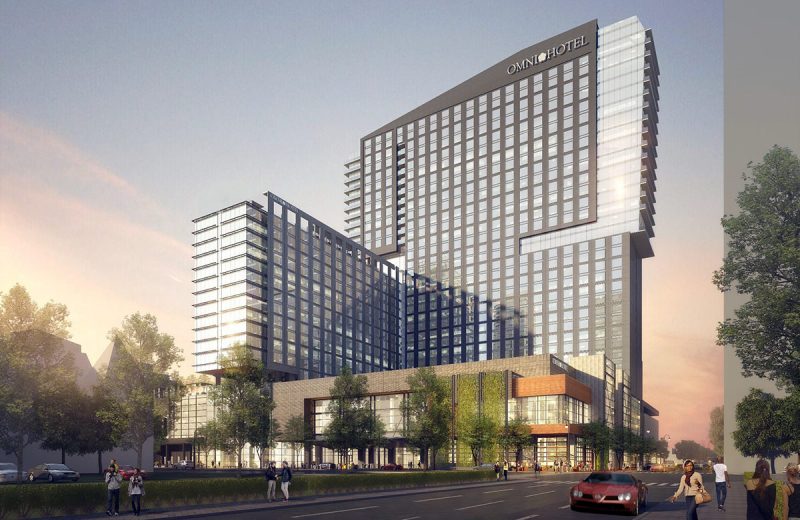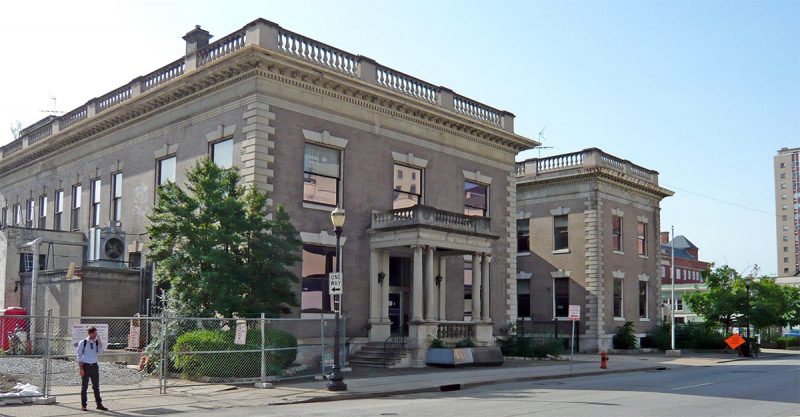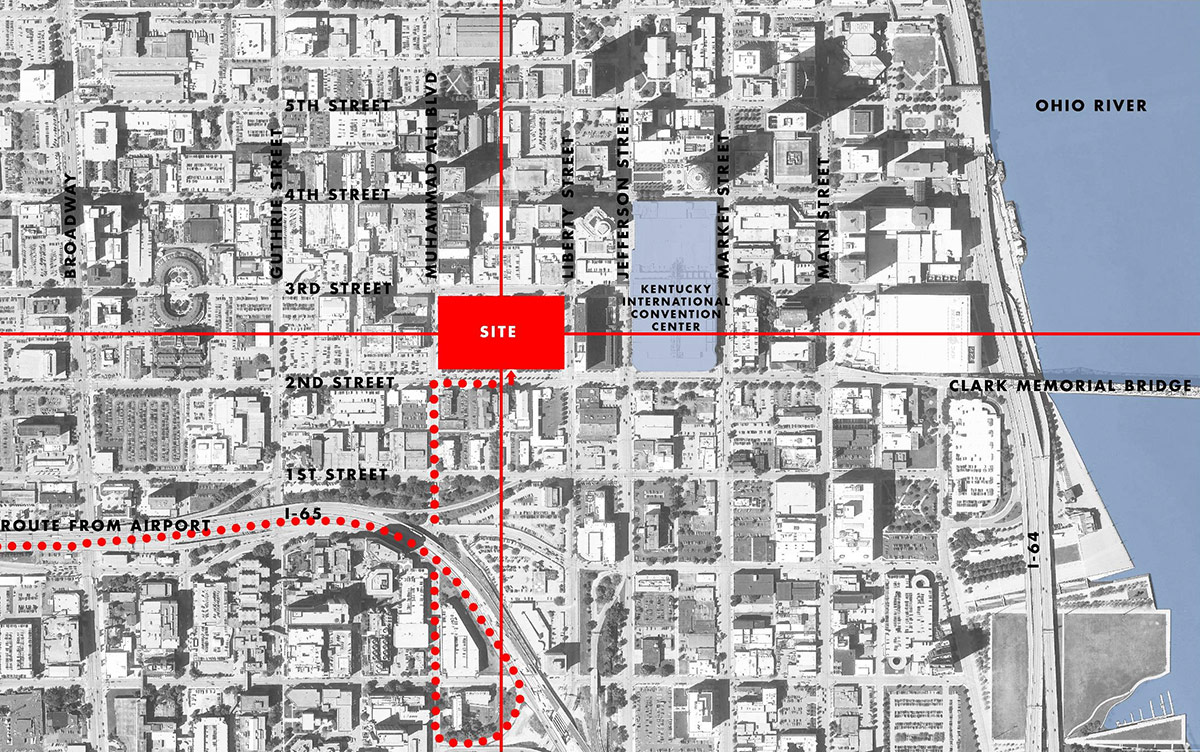Louisville entrepreneur Gill Holland has taken issue with the planned Omni Hotel & Residences slated for the former Water Company Block in Downtown Louisville. In an op-ed for the Courier-Journal called “Listen to community on Omni issues” and dated July 6, a clearly frustrated Holland noted that “the groundswell of citizen dismay is growing,” adding that the entire process “has been a serious disappointment in democracy.”
He was referring to problems that are becoming increasingly apparent with the Omni plan as it stands today.

Like many who are critical of the current plan—including Broken Sidewalk—Holland supports building the hotel in the city. He acknowledges that Louisville needs more hotel rooms. He goes on to say that “it often makes sense for government to use our taxpayer dollars to incentivize private corporations if it is a good investment of those dollars”—Metro Louisville is subsidizing the $289 million complex with $139 million in taxpayer dollars. His caveat, however, is that if public funds are used, there better be more than the standard return on investment (ROI). Holland wants a “Return on Community” or ROC.
Holland laid out his concerns clearly in his op-ed:
There are two main problems with this deal. One is financial. The clause of the contract where the city contractually promises NOT to incentivize any other significant (more than 400 rooms) hotel group within a mile of downtown for almost 10 years is of utmost concern. In my mind, the city will grow significantly in the next decade, and we will need another major hotel. But nope, that can’t happen, not if it is within a mile. What if a developer wants to build a 400-room hotel overlooking the upcoming Waterfront Park West? Nope. This clause is a competition killer, and government should encourage competition, not stifle it.
The second problem is a general lack of transparency and community involvement in this deal. When city government commits a huge amount ($139 million) of taxpayer dollars to subsidize a private corporation, there is a huge corresponding responsibility to include community input. This deal was done without adequate community input.

Despite the community coming forward with an interest in being part of the process, most visibly with a design charrette on improving the Omni design and finding ways to save the old Water Company Headquarters, Holland laments the city’s lack of concern and attitude that the “deal is done.”
Holland suggested that a “Development Mitigation Fund” be established for future city deals with a high level of subsidy. One percent of the project budget would be included in this fund to support community goals, such as preservation or establishing future design charrettes—essentially to bring the community into the process.
Holland knows a thing or two about community building and responsible development. He helped lay the groundwork for what is today Nulu by developing The Green Building and working to rehab dozens of properties along East Market Street. He is currently pursuing an aggressive revitalization campaign in the Portland neighborhood under the banner of the Portland Investment Initiative.



The clause prohibiting large scale hotels is a joke and should not have been allowed. It limits large hotel additions in downtown for almost a decade. Most of the rest of his complaint is asthetic and secondary to that in my opinion. I can’t believe that Metro Govt would limit our development like that, but who am I kidding that’s what happens everytime in Louisville.
Jason, Gill Holland and anyone who believes another large-scale hotel will be considered in downtown Louisville is not realistic. The Marriott is the only large-scale hotel built downtown since the Hyatt Regency in the late seventies or early eighties and will be thirteen years old by the completion of the Omni.
Frankly, the glut of hotels we already have will be increasingly difficult to fill as downtown continues to lose its core employers like Humana. Instead of hotels. Louisville will need to find tenants for the vacant office buildings left behind by the 12,000 Humana employees. The odds of a 400-room hotel being considered within one mile of the Omni within ten years is so remote that it was a no-brainer for the city. Even if there were to be a need, the Hyatt is 393 rooms. That is considered a large hotel and the agreement does not prevent the city from offering incentives for hotels of less than 400 rooms.
Finally, a large luxury hotel across from the slummiest area of the city and the most dangerous public housing projects? Waterfront Park West is decades from reality while Holland is off his rocker!
Wow. Such Pessimism. Much distraught comment.
Regardless of the business climate and whether or not Humana will keep jobs here, Louisville’s big business downtown is still conventioneering. The Convention Center is growing in the next couple years and likely may need to grow again a few years after that. We don’t have anywhere near enough hotel rooms Downtown to feed that monster at its worst. The FFA hates Indy, but they keep threatening to leave again because they have send people to hotels as far as 45 minutes from Downtown… (As a Downtown resident, the FFA week has become a colossal traffic nightmare…) Sure, the FFA is just one convention, but to keep competing with Indy and Nashville we have to keep the FFA happy and attract more FFA-scale conventions…
Also, your view of West Louisville is naive and vicious and I feel sad for you. A 400+ Hotel for Waterfront Park West would only be a boon to the city. I’m kind of hoping now that Gil Holland starts working to attract one ASAP just to spite naysayers and downtown haters (and also because it would be a great idea).
“I’m Gil Holland. Waaaah! Waaaah! A corrupt deal with taxpayer money going to rich people and I wasn’t invited?!”
I guess you’re gonna have to drown your sorrows by finding another poor neighborhood to drive all the poor people living in it out of, Gil.
Just curious Ingolfr, was the area that is now known as Nulu ever home to low income people as sort of an extension of Clarksdale or was it just empty and derelict shopfronts housing things that didn’t necessarily draw people to the area? It seems like he just became the figurehead of a nearly inevitable process that would have started after the destruction of Clarksdale. It seems like the process will repeat itself in that area around Portland with Waterfront Park west, its just this time he’s just getting in earlier, though I really do believe he is trying to do more than profit through gentrification and would prefer if the rising tide helped the current residents as well, as he does seem to be getting involved at an extremely early stage and doing other things for the community.
No matter what you think about Gill Holland, and I completely understand being skeptical, the development is lacking, notably on that third street side. I don’t see people can’t learn from what has happened around so many other buildings downtown. The west side of kindred (even east side and basically the entire thing for that matter), the south and west side of the marriot, and sadly other examples. It’s good to see in the articles recently that Omni understands what it is doing and was hoping to get away with it, and it looks like there may well be some shopfronts on third and things of pedestrian interest, but fortunately people have called them and mayor corporate-supplicator fischer out on it.
I think Gill’s argument is somewhat of jaded one, and I would probably feel the same if I were in his shoes. In short, the city is committing $139,000,000 of city funds to do what? To increase hotel capacity for the city so we can attract couple more conventions a year. That’s about it in a nutshell. additionally, to appease the major investors/decision makers in Louisville, they will offer some ultra premium apartments for them to use 3 nights out of the year. That’s it; sure you get some construction jobs and Louisville vendors will get some short term boosts in business, but really that’s it. We lose a valuable city block, we are driving the preservationists crazy, and we don’t achieve any more of a livable/walkable downtown then what it is today (i.e. that grocery store seems more and more bogus by the day).
I think what Gill is saying, you give him $139,000,000 in city support and he will offer the city a far better return on investment than just a couple more conventions a year. We could do big things we that type f support. Get Gill Holland, Steve Poe, and the Brown Family that kind of support and we could do some Real Change in this city. Give that kind of support to and out of town corporation and got ourselves another 4th Street Live on our hands.
One thing I find funny on the preservationist side of things is that the Old Fellow Hall doesn’t get brought up much. You want to know why? Old Fellows Hall is the former home of the Pendennis Club. Anyone who knows the Pendennis club may also know it as the Good Ol Boys CLub. Get the decision makers in this town behind our objections and some real change can happen int his development.
If you asked my opinion on whether I would take this project as is or not have it at all. I would probably say take it as is because I am an optimist in hoping this will attract more investment in Louisville. But I think we would have said the same things about 4th Street Live…
Jon C